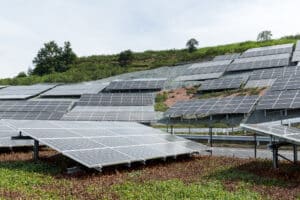
The UK’s energy supply could require more than £900 billion in capital expenditure to achieve net zero by 2050, opening up a significant opportunity for public and private capital in enabling a successful transition, according to a new report published by NatWest and Boston Consulting Group (BCG) today.
Signalling the scale of investment needed, NatWest and BCG said the shift to a net zero energy supply is likely to involve significant investment in renewable generation, network infrastructure and new technologies such as energy storage systems, carbon capture and storage, and hydrogen. The report suggests businesses could accelerate and deliver change by working together to test low-carbon solutions, building greater security and resilience into the energy system, and unlocking revenue in the UK.
However, for the transition to be successful, it would be essential for banks and investors, regulators, policy makers, energy companies and supply chains to work together to overcome the challenges to mobilising this investment. Several key market developments would be needed to enable the transition, including clear and decisive government policy, co-operation between banks and investors to address the challenges to scaling investment, and strong commitments from energy companies to put new technologies on the market.
Andy Gray, Managing Director of Commercial Mid-Market at NatWest Group, said: “The UK needs clean, stable and affordable energy supplies, but huge capital expenditure is needed to make this a reality. This report estimates that the UK’s energy supply needs over £900 billion to reach net zero by 2050. Mobilising the capital needed will be complex, and the findings serve as a clear call for all actors across the system to work together to find solutions.
“To decarbonise the UK’s energy supply, the industry needs to scale its infrastructure and technology, all of which will require finance. It’s clear that there needs to be greater collaboration between policy, regulation and finance to enable this to happen. Investment in green infrastructure will help to pay for itself through generating jobs and economic growth, so it’s vital the entire value chain works together to make this happen.”
Eriola Beetz, Managing Director and Partner in Boston Consulting Group, said: “To reach net zero by 2050, the energy system must undergo a tectonic shift. Society has gone through energy transitions in the past — but nothing like this one. Changes are already underway with energy sources such as renewables, the accelerated expansion of electricity networks, and the scale up of new energy technologies, but we are just at the beginning of the journey.
“As the clock keeps ticking, one of the key challenges we face is plugging a substantial investment gap to support the quick roll out of solutions and innovation we desperately need. Financial institutions are in an excellent position to leverage the learnings and experience from backing technologies such as wind and solar over the last decade.”
NatWest Group has been externally recognised as a leading lender to the UK renewables sector over the past 10 years. The bank is committed to supporting the investment needed to support the UK to transition to a net zero economy and has targeted providing £100 billion of Climate and Sustainable Funding and Financing by the end of 2025.
Read more:
UK’s energy supply needs over £900 billion investment to reach net zero by 2050




